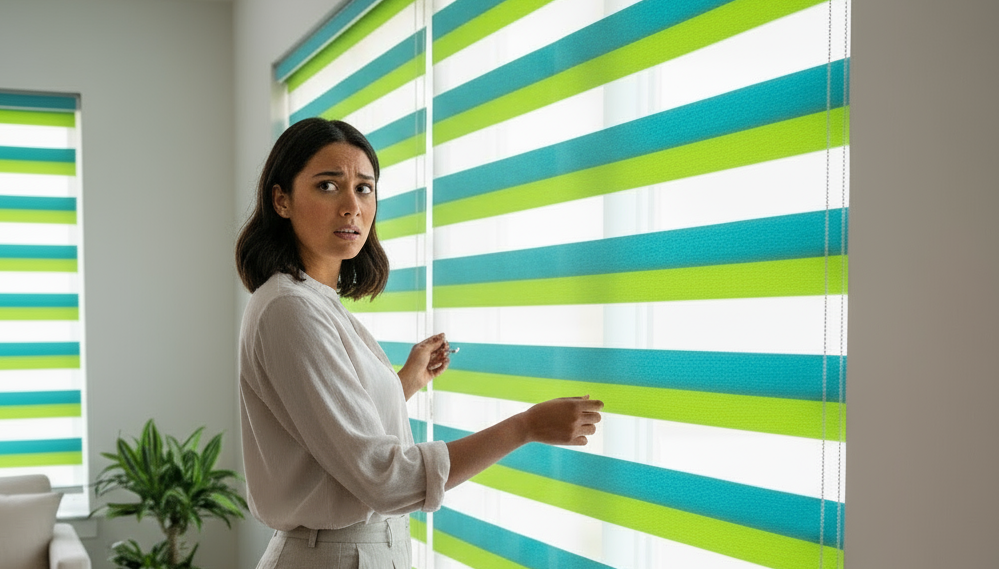If you are about to buy zebra shades for you new home or office, do read this guide before buying because zebra shade is not for anyone. But that's not the fault of zebra shade and in most cases, people love this window treatment for good reasons.
However, there are limitations for zebra shades too. These "shortcoming", or say, uniqueness, might cause some trouble for you when you find out this is not what you want.
That's why we write this article, and as a manufacturer of window shades over 20 years, we know exactly how zebra shades would match your place or not, be it office, bedroom, living room or other places.
Whether you're considering zebra shades for your home or already questioning whether they're right for your specific circumstances, understanding their drawbacks and limitations will help you make the best choice for your space and situation.
Design Style Incompatibility
One of the most significant reasons zebra shades don't work for everyone is their strong contemporary aesthetic that can clash with certain interior design styles.
Traditional and classical interiors often look better with window treatments that complement ornate furnishings, rich fabrics, and historical architectural details. Zebra shades' sleek, modern mechanism and clean lines can appear jarringly contemporary in spaces filled with antiques, traditional patterns, and formal decorative elements.
Rustic and farmhouse aesthetics emphasize natural, handmade, and weathered elements that contrast sharply with zebra shades' manufactured precision. These design styles typically favor natural wood blinds, simple curtains, or roman shades that complement the relaxed, organic feeling of farmhouse decorating.
Victorian and period-specific homes require window treatments that respect the historical integrity of the architecture. Zebra shades' high-tech functionality and contemporary appearance can undermine the authentic period atmosphere that these homes are meant to preserve.
Bohemian and eclectic styles often celebrate color, pattern, and texture in ways that zebra shades' neutral, structured appearance can't match. These decorating approaches typically favor curtains, tapestries, or other fabric treatments that add artistic flair and personality.
Cottage and country styles emphasize comfort, tradition, and handcrafted elements that zebra shades' sleek efficiency contradicts. These styles typically work better with simple curtains, traditional blinds, or other treatments that feel more casual and approachable.
Formal traditional settings like dining rooms or living rooms decorated in classic styles may find zebra shades too casual or contemporary for the elegant atmosphere they're trying to create.
Functional Limitations in Specific Environments
Beyond style considerations, zebra shades have functional limitations that make them unsuitable for certain environments and use cases.
High-humidity environments like bathrooms with poor ventilation or steamy kitchens can damage zebra shade fabrics over time. The moisture can cause warping, mold growth, or fabric degradation that other window treatments handle better.
Extreme temperature fluctuations can affect zebra shade operation and longevity. Rooms with significant temperature swings, like sunrooms or poorly insulated spaces, may experience fabric expansion and contraction that affects band alignment.
Heavy cooking areas where grease and food particles are airborne can quickly soil zebra shade fabrics in ways that are difficult to clean. Traditional blinds or washable curtains often perform better in these environments.
Children's rooms with very active kids might not be suitable for delicate zebra shade mechanisms. Despite safety features, curious children might damage the dual-layer system through rough handling or attempts to manipulate the bands directly.
Pet-heavy households where cats might claw fabric or dogs might jump against windows could face premature zebra shade damage. More durable options like cellular shades or traditional blinds might withstand pet activity better.
Workshop or garage windows where dust, debris, or chemical exposure is common require more rugged window treatments than delicate zebra shade fabrics can provide.
Commercial or industrial settings often need window treatments that can withstand constant use, easy cleaning, and potential abuse that zebra shades aren't designed to handle.
Budget and Value Considerations
For many homeowners, the cost-benefit analysis of zebra shades doesn't add up favorably compared to simpler alternatives.
Initial investment costs for quality zebra shades often exceed basic roller shades or simple blinds by significant margins. For budget-conscious homeowners, this premium may not be justifiable for the additional functionality provided.
Maintenance and replacement expenses can add up over time. Zebra shades have more complex mechanisms than simple alternatives, potentially leading to higher repair costs or earlier replacement needs.
Installation complexity often requires professional installation that adds to the total project cost. DIY-friendly homeowners might prefer simpler window treatments they can install and maintain themselves.
Limited durability benefits compared to some alternatives mean the higher initial cost doesn't always translate to proportionally longer lifespan. Simple roller shades or quality blinds might provide better cost-per-year value.
Opportunity cost considerations matter when home improvement budgets are limited. The premium spent on zebra shades might deliver more value if invested in other home improvements or higher-priority needs.
Rental property limitations make expensive window treatments impractical for tenants who can't take them when moving or landlords who need cost-effective solutions for multiple units.
Technology and Complexity Challenges
The sophisticated design that makes zebra shades appealing to some homeowners creates barriers for others who prefer simpler solutions.
Mechanical complexity means more potential points of failure compared to basic window treatments. Homeowners who value reliability and simplicity might prefer options with fewer moving parts.
Learning curve requirements for optimal use can frustrate homeowners who want straightforward window treatments. Understanding how to achieve different light control effects takes time and experimentation that some people find tedious.
Repair and troubleshooting challenges arise when complex mechanisms malfunction. Unlike simple blinds where problems are often obvious and fixable, zebra shade issues might require professional service.
Technology intimidation affects homeowners who feel overwhelmed by the various positioning options and adjustment possibilities. Some people prefer the simplicity of "open" or "closed" without intermediate positions.
Motorization complexity adds another layer of potential problems and maintenance requirements that some homeowners want to avoid entirely.
Smart home integration requirements for advanced features might exceed the technical comfort level of homeowners who prefer analog solutions to digital ones.
Specific Performance Limitations
Even in appropriate settings, zebra shades have inherent limitations that might not meet certain performance requirements.
Incomplete light blocking means zebra shades can't provide true blackout conditions without additional treatments. Shift workers, light-sensitive sleepers, or media rooms might need blackout shades instead.
Limited insulation properties compared to cellular shades or insulated curtains mean zebra shades provide only moderate energy efficiency benefits. Homes in extreme climates might benefit more from window treatments with superior insulating properties.
Noise reduction capabilities are minimal compared to heavy curtains or specialized acoustic treatments. Homes near busy streets or airports might need window treatments with better sound-dampening properties.
Wind resistance issues can affect operation in areas with frequent strong winds. Traditional blinds or more secured window treatments might perform better in windy locations.
Size limitations for very large windows might require multiple panels or special hardware that complicates installation and operation.
Custom sizing costs for unusual window shapes or sizes can become prohibitively expensive compared to standard-sized alternatives.
Lifestyle and Personal Preference Mismatches
Sometimes zebra shades simply don't match how people want to live in their homes.
Set-and-forget preferences of homeowners who rarely adjust their window treatments make zebra shades' infinite adjustability unnecessary. Simple solutions that stay in one position work better for these users.
Minimal maintenance desires conflict with zebra shades' need for periodic cleaning and potential alignment adjustments. Low-maintenance homeowners might prefer options that require less attention.
Tactile preferences for natural materials like wood or fabric might not be satisfied by zebra shades' manufactured materials and smooth operation. Some people prefer the feel and sound of traditional blinds or natural curtains.
Privacy priority homeowners who value maximum privacy over light control might find zebra shades' filtered light approach insufficient for their comfort level.
View preservation is sometimes more important than light control. Homeowners with beautiful views might prefer clear glass or minimal window treatments rather than any filtering or obstruction.
Seasonal decoration enthusiasts who like to change window treatments with the seasons might find zebra shades too permanent or neutral for their decorating style.
Making the Right Choice for Your Situation
Understanding zebra shades' limitations helps identify when alternative window treatments might serve you better.
Honest needs assessment should prioritize your actual requirements over trendy features. If simple light control meets your needs, simpler solutions might provide better value.
Lifestyle matching is crucial. Consider how you actually use your windows and whether zebra shades' capabilities align with your daily routines and preferences.
Long-term thinking about your home's evolution, your changing needs, and your decorating plans helps avoid purchasing window treatments you'll want to replace soon.
Professional consultation can help identify whether zebra shades' benefits justify their limitations in your specific situation, or whether alternatives might serve you better.
Alternative exploration of curtains, cellular shades, roller shades, or traditional blinds might reveal better matches for your needs and preferences.
Frequently Asked Questions
What are the main alternatives to zebra shades?
Popular alternatives include cellular shades for insulation, roller shades for simplicity, Roman shades for traditional style, and horizontal blinds for precise light control. Each offers different benefits depending on your priorities.
Can zebra shades be made to work in traditional decor?
While possible with careful color and fabric selection, zebra shades' inherent contemporary functionality often conflicts with traditional aesthetics. Traditional alternatives usually provide better style coherence.
Are there budget-friendly versions of zebra shades?
Budget zebra shades are available but often compromise on durability, smooth operation, or fabric quality in ways that can lead to frustration and earlier replacement needs.
How do I know if zebra shades are right for my home?
Consider your design style, actual light control needs, maintenance preferences, and budget. If you value precise light control and modern aesthetics while accepting higher complexity and cost, zebra shades might work well.
What should I do if I've already bought zebra shades but they're not working out?
Many retailers offer return policies for window treatments. If return isn't possible, consider whether different positioning or usage patterns might improve your experience, or whether the shades might work better in different rooms.
Zebra shades are excellent window treatments for specific situations and preferences, but they're not universal solutions. Understanding their limitations helps you make informed decisions that match your actual needs rather than following trends that might not serve you well in the long term.
If zebra shades don't seem right for your situation, explore AOSKY's complete window treatment collection to find options that better match your style, needs, and preferences.



